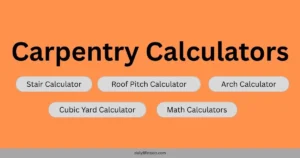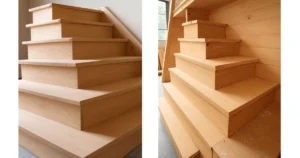If you’re just starting in carpentry, whether in Tennessee, Massachusetts, or anywhere else, one of the trickiest parts is figuring out how to price your work. A solid quote can make or break your project, ensuring you cover costs, make a profit, and keep your clients happy.
As a part-time carpenter with over a decade of experience exploring woodworking across the USA, I’ve learned the ins and outs of crafting fair, competitive quotes.
In this guide, I’ll walk you through how carpenters calculate their quotes, how calculate carpentry quotes for beginners, carpenters’ pricing guide 2025, and accurate carpentry project estimates to help you master this skill.
Let’s dive in!
Check Also: 5 Best Carpenter Calculators
Table of Contents
Why Accurate Quotes Matter for Beginner Carpenters
Getting your quote right is crucial. Underquote, and you’re working for peanuts or losing money. Overquote, and you might scare off clients. A good quote shows you’re professional, builds trust, and helps you plan projects, whether you’re framing a house in Memphis or building custom furniture in Nashville.
My other articles, like Understanding Carpenter Calculators for Beginners and How to Choose a Carpenter Calculator for Beginners, highlight tools like the Industries 4065 Construction Master Pro to make calculations easier.
But first, let’s break down the key pieces of a carpentry quote.
Key Components of a Carpentry Quote
To create an accurate carpentry project estimate, carpenters consider several factors. Here’s what goes into a solid quote:
1. Project Scope: Know the Job Inside and Out
Before you crunch numbers, understand what the client wants. Are you building a deck in Chattanooga or installing trim in Knoxville? Ask about:
- Purpose: Is it a custom bookshelf or structural framing?
- Materials: Do they want oak, pine, or composite?
- Site Conditions: Are there tricky slopes or tight spaces?
A site visit is key for beginner carpenter quoting tips. It helps spot challenges, like uneven floors, that could affect your time and costs. Clear communication with the client ensures you’re on the same page, reducing surprises later.
2. Material Costs: Calculate Every Nail and Board
Materials are a big chunk of your quote. For carpentry material cost estimation, list everything:
- Wood (e.g., lumber, plywood)
- Fasteners (nails, screws)
- Adhesives and finishes
- Specialty items (hardware, brackets)
Don’t forget to account for waste, about 10-15% extra is standard. Many carpenters add a 15-20% markup on materials to cover sourcing and handling. Tools like the Victor C6000 Advanced Construction Calculator, recommended in my article “5 Best Carpenter Calculators for Beginners”, can help you estimate material quantities fast.
3. Labor Costs: Value Your Time
Labor is where you charge for your skills. For calculating carpentry labor costs, consider:
- Hourly Rate: Beginner carpenters might charge $30-$50 per hour, depending on location (e.g., higher in Massachusetts, lower in Tennessee). Experienced pros can charge up to $80.
- Time Estimate: Break the project into phases: design, cutting, assembly, finishing. Estimate hours for each.
- Extra Help: If you need a helper, factor in their rate too.
For example, framing a 1,000-square-foot room might take 20 hours. At $40/hour, that’s $800 in labor. The Industries 4065, praised in my “How to Choose a Carpenter Calculator” guide, can speed up these calculations.
4. Overhead and Profit: Keep Your Business Running
Running a carpentry business isn’t free. Carpentry business overhead costs include:
- Insurance
- Tool maintenance
- Fuel or shop utilities
Add these to your quote, usually as a percentage of the total cost. Then, include a profit margin, typically 10-30%, to ensure your business grows. For beginner carpenter pricing strategies, start with a modest 15% profit margin to stay competitive.
5. Additional Expenses: Cover All Bases
Don’t overlook extras like:
- Permits: Required for structural work in many areas.
- Travel Time: If you’re driving to a rural Pennsylvania jobsite, factor in fuel and time.
- Service Calls: For follow-ups or fixes.
These ensure your carpentry job cost breakdown is complete. My “How-To Videos & Guides” article shows how tools like the Construction Master 5 can calculate costs for stairs or rafters, saving you time on these extras.
Common Pricing Methods for Carpentry Quotes
Carpenters use different methods depending on the project. Here are the main ones for how to price carpentry work:
- Per Square Foot: Ideal for framing or flooring. For example, rough carpentry might cost $5-$10 per square foot.
- Per Linear Foot: Used for trim, molding, or cabinetry. Baseboards might run $2-$5 per linear foot.
- Per Item: For defined tasks like installing a door ($100-$300 each).
These methods simplify carpentry quote calculation methods for beginners. Track your bids, as I mentioned in my “Understanding Carpenter Calculators” article, to refine your pricing over time.
Step-by-Step Guide to Creating a Carpentry Quote
Here’s a simple process for how to create a carpentry quote for beginners:
- Visit the Site: Assess the project and note any challenges.
- Define the Scope: List tasks, materials, and timeline with the client.
- Estimate Materials: Calculate quantities and costs, adding a 15-20% markup.
- Calculate Labor: Multiply estimated hours by your hourly rate.
- Add Overhead and Profit: Include business costs and a 10-30% margin.
- Include Extras: Factor in permits, travel, or other fees.
- Present the Quote: Use a clear, detailed format to build trust.
The formula looks like this: (Material Costs x Markup) + (Hours x Hourly Rate) + Overhead + Profit + Extras = Total Quote
For example, a $500 material cost with 20% markup ($600), 20 hours at $40/hour ($800), $100 overhead, 15% profit ($225), and $50 permit fee equals a $1,775 quote.
Tips for Professional Carpentry Quotes
To stand out, follow these beginner carpenter quoting tips:
- Be Transparent: Break down costs so clients see where their money goes.
- Communicate Clearly: Discuss the scope to avoid misunderstandings.
- Track Bids: Review past quotes to improve accuracy, as noted by Tennessee pro John Smith of Smith’s Woodworks.
- Negotiate Smartly: Be ready to adjust terms while protecting your profit.
These tips, paired with tools from my 5 Best Carpenter Calculators guide, like the Industries 4065, ensure your quotes are spot-on.
Why Trust This Guide?
As a part-time carpenter based in Tennessee, I’ve quoted projects from Nashville’s custom cabinets to Michigan’s home renovations. I’ve tested pricing strategies on real job sites and consulted pros like Sarah Johnson of Chattanooga’s Johnson Carpentry for insights.
Conclusion: How Carpenters Calculate Their Quotes
Mastering how to calculate carpentry quotes for beginners sets you up for success. Use the Industries 4065 for pro-level accuracy or the budget-friendly Victor C6000 to estimate materials, labor, and more. If you’re in Tennessee or Illinois, a clear, detailed quote builds trust and keeps projects profitable. Start pricing like a pro today!
Related Articles: 8 FREE Online Carpenter Calculators
1. Stair Calculator
2. Roof Pitch Calculator
3. Arch Calculator
4. Cubic Yard Calculator
5. Land Area Calculator
6. Square Root Calculator
7. Fraction Calculator
8. Metric Stair Calculator







